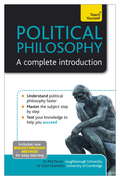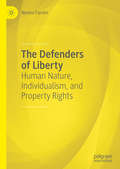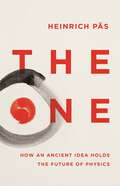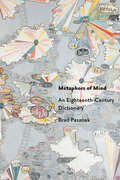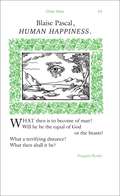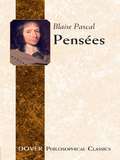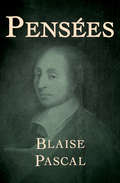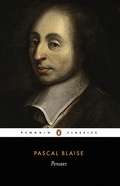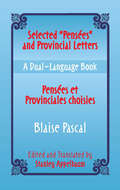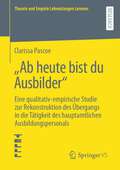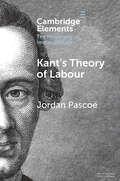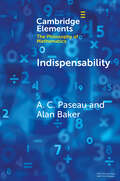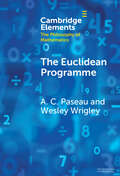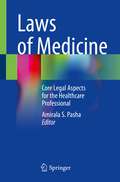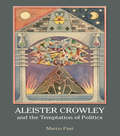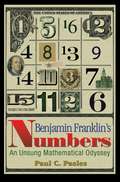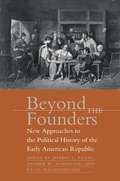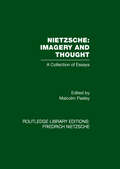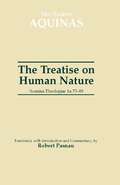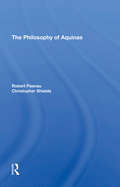- Table View
- List View
Political Philosophy: Teach Yourself
by Phil Parvin Clare ChambersWritten by Phil Parvin and Clare Chambers, who are current political philosophy lecturers and leading researchers, Political Philosophy - The Essentials is designed to give you everything you need to succeed, all in one place. It covers the key areas that students are expected to be confident in, outlining the basics in clear jargon-free English, and then providing added-value features like summaries of key thinkers, and even lists of questions you might be asked in your seminar or exam. The book's structure follows that of most university courses on political philosophy, by looking at the essential concepts within political philosophy (freedom, equality, power, democracy, rights, the state, political obligation), and then looking at the ways in which piolitical philosophers have used these fundamental concepts in order to tackle a range of normative political questions such as whether the state has a responsibility to alleviate inequalities, and what interest liberal and demovratic states should take in the cultural or religious beliefs of citizens. Teach Yourself titles employ the 'Breakthrough method', which is designed specifically to overcome problems that students face. - Problem: 'I find it difficult to remember what I've read.'; Solution: this book includes end-of-chapter questions and summaries, - Problem: 'Most books mention important other sources, but I can never find them in time.'; Solution: this book includes key texts and case studies are summarised, complete with fully referenced quotes ready to use in your essay or exam. - Problem: 'Lots of introductory books turn out to cover totally different topics than my course.'; Solution: this book is written by a current university lecturer who understands what students are expected to know.
Political Philosophy: A Complete Introduction: Teach Yourself
by Phil Parvin Clare ChambersWritten by Phil Parvin and Clare Chambers, who are current political philosophy lecturers and leading researchers, Political Philosophy - The Essentials is designed to give you everything you need to succeed, all in one place. It covers the key areas that students are expected to be confident in, outlining the basics in clear jargon-free English, and then providing added-value features like summaries of key thinkers, and even lists of questions you might be asked in your seminar or exam. The book's structure follows that of most university courses on political philosophy, by looking at the essential concepts within political philosophy (freedom, equality, power, democracy, rights, the state, political obligation), and then looking at the ways in which piolitical philosophers have used these fundamental concepts in order to tackle a range of normative political questions such as whether the state has a responsibility to alleviate inequalities, and what interest liberal and demovratic states should take in the cultural or religious beliefs of citizens. Teach Yourself titles employ the 'Breakthrough method', which is designed specifically to overcome problems that students face. - Problem: 'I find it difficult to remember what I've read.'; Solution: this book includes end-of-chapter questions and summaries, - Problem: 'Most books mention important other sources, but I can never find them in time.'; Solution: this book includes key texts and case studies are summarised, complete with fully referenced quotes ready to use in your essay or exam. - Problem: 'Lots of introductory books turn out to cover totally different topics than my course.'; Solution: this book is written by a current university lecturer who understands what students are expected to know.
The Defenders of Liberty: Human Nature, Individualism, and Property Rights
by Neema ParviniThe Defenders of Liberty presents a history of economic liberalism from the Renaissance to the present. It chronicles the tradition of thought that sees human nature as social yet self-interested, methodological individualism as its key analytical tool, and property rights as foundational to a civilised society. In the development of this way of thinking, it considers the contributions of many key thinkers including Niccolò Machiavelli, Thomas Hobbes, John Locke, Richard Cantillon, A.J.R. Turgot, David Hume, Adam Smith, Nassau William Senior, Richard Cobden, Herbert Spencer, Jean-Baptiste Say, Carl Menger, William Stanley Jevons, Gaetano Mosca, Eugen Böhm-Bawerk, Vilfredo Pareto, Phillip Wicksteed, Edwin Cannan, Ludwig von Mises, Lionel Robbins, F.A. Hayek, W.H. Hutt, Milton Friedman, George Stigler, Murray N. Rothbard, James M. Buchanan, and Thomas Sowell. The book contends that liberalism needs to be grounded in realism, and that it has been derailed whenever economists have deviated from an explicitly realist understanding of human nature, individualism and property rights. It argues that the cause of liberalism was compromised by errors in economic reasoning by such major figures as David Ricardo, John Stuart Mill, Alfred Marshall, A.C. Pigou, and John Maynard Keynes. In diagnosing what has gone wrong for liberalism in the twenty-first century, The Defenders of Liberty argues against substituting mathematical abstraction for causal realism; it opposes interventionist central banking; it seeks to recover economic liberalism from social and political liberalism, which are somewhat unrelated schools of thought; it resists a view of human nature rooted in selfishness or atomised individualism; and finally alerts defenders of freedom to the ruthless but effective language games played by their opponents. This book will be of interest to the educated general reader as well as undergraduates and postgraduates in disciplines such as economics, political theory and philosophy.
The Post colonial and Imperial Experience in American Transcendentalism
by Marek ParyzAnalyses literary representations of the American experience in selected works of Ralph Waldo Emerson, Henry David Thoreau, and Walt Whitman. Reveals the ambivalence that underlay the cultural and political development of the United States as a former colony.
The One: How an Ancient Idea Holds the Future of Physics
by Heinrich PäsA "fascinating [and] provocative" argument by a particle physicist—marshalling a "heady mix of history, philosophy and cutting-edge theory" (Wall Street Journal)—for monism, the ancient idea about the universe that says, All is One In The One, particle physicist Heinrich Päs presents a bold idea: fundamentally, everything in the universe is an aspect of one unified whole. The idea, called monism, has a rich three-thousand-year history: Plato believed that &“all is one&” before monism was rejected as irrational and suppressed as a heresy by the medieval Church. Nevertheless, monism persisted, inspiring Enlightenment science and Romantic poetry. Päs aims to show how monism could inspire physics today, how it could slice through the intellectual stagnation that has bogged down progress in modern physics and help the field achieve the grand theory of everything it has been chasing for decades. Blending physics, philosophy, and the history of ideas, The One is an epic, mind-expanding journey through millennia of human thought and into the nature of reality itself.
The Perfect Wave
by Heinrich PasAlmost weightless and able to pass through the densest materials with ease, neutrinos seem to defy the laws of nature. But these mysterious particles may hold the key to our deepest questions about the universe, says physicist Heinrich Pas. In "The Perfect Wave," Pas serves as our fluent, deeply knowledgeable guide to a particle world that tests the boundaries of space, time, and human knowledge. The existence of the neutrino was first proposed in 1930, but decades passed before one was detected. Pas animates the philosophical and scientific developments that led to and have followed from this seminal discovery, ranging from familiar topics of relativity and quantum mechanics to more speculative theories about dark energy and supersymmetry. Many cutting-edge topics in neutrino research--conjectures about the origin of matter, extra-dimensional spacetime, and the possibility of time travel--remain unproven. But Pas describes the ambitious projects under way that may confirm them, including accelerator experiments at CERN and Fermilab, huge subterranean telescopes designed to detect high-energy neutrino radiation, and the Planck space observatory scheduled to investigate the role of neutrinos in cosmic evolution. As Pass history of the neutrino illustrates, what is now established fact often sounded wildly implausible and unnatural when first proposed. The radical side of physics is both an exciting and an essential part of scientific progress, and "The Perfect Wave" renders it accessible to the interested reader.
Metaphors of Mind: An Eighteenth-Century Dictionary
by Brad PasanekA pathbreaking introduction to eighteenth-century metaphors of the mind that recasts the grand narrative of the Enlightenment in terms of its tropes and figures.An encyclopedic dictionary along the lines of Voltaire’s classic Dictionnaire Philosophique, Metaphors of Mind provides an in-depth look at the myriad ways in which Enlightenment writers used figures of speech to characterize the mind. Drawn from Brad Pasanek’s massive online archive, http://metaphorized.net, this volume constitutes a veritable treasury of mental metaphorics.Dividing the book into eleven broad metaphorical categories—Animals, Coinage, Court, Empire, Fetters, Impressions, Inhabitants, Metal, Mirror, Rooms, and Writing—Pasanek maps out constellations of metaphors. He frames his collection of literary excerpts in each section with a more descriptive and theoretical discussion of what he calls "desultory reading," a form of unsystematic perusal of writing frequently employed by Enlightenment thinkers. By surveying the printed past alongside the digital present, the book treats eighteenth-century writing as its topic while essentially exemplifying its rhetorical approach.More than an exercise in quotation, this intellectual history offers illuminating readings of fragmentary literary works and confrontations with neoclassical and contemporary theories of metaphor. The book’s entries complicate received ideas about Locke’s blank slate, question M. H. Abrams’ claims about mirrors and lamps, and chart changing frequencies of metal metaphors in a moment of industrial revolution. The book also responds to current anxieties about reading and the mass digitization of literature, touching on recent discussions of "distant reading," "shallow reading," and "surface reading." Promoting critical and creative anachronism, Metaphors of Mind redefines the notion of an archive in the age of Amazon and Google Books.
Human Happiness (Penguin Great Ideas)
by Blaise PascalCreated by the seventeenth-century philosopher and mathematician Pascal, the essays contained in Human Happiness are a curiously optimistic look at whether humans can ever find satisfaction and real joy in life – or whether a belief in God is a wise gamble at best. Throughout history, some books have changed the world. They have transformed the way we see ourselves – and each other. They have inspired debate, dissent, war and revolution. They have enlightened, outraged, provoked and comforted. They have enriched lives – and destroyed them. Now Penguin brings you the works of the great thinkers, pioneers, radicals and visionaries whose ideas shook civilization and helped make us who we are.
Pensées
by Blaise Pascal"Men despise religion. They hate it and are afraid it may be true," declared Pascal in his Penseés. "The cure for this," he explained, "is first to show that religion is not contrary to reason, but worthy of reverence and respect. Next make it attractive, make good men wish it were true, and then show that it is." Motivated by the 17th-century view of the supremacy of human reason, Pascal (1623-1662) intended to write an ambitious apologia for Christianity, in which he argued the inability of reason to address metaphysical problems. While Pascal's untimely death prevented his completion of the work, these fragments published posthumously in 1670 as Penseés remain a vital part of religious and philosophical literature. Introduction by T. S. Eliot.
Pensées
by Blaise PascalAn illuminating exploration of the nature of faith from one of history's greatest thinkers Blaise Pascal was not a gambler, but he posited one of the most famous wagers of all time: Every man's life is a bet against God. It is a wager that any man can win, however. Sacrifice earthly pleasures--drink, lust, sin, etc.--and a lifetime of happiness awaits, in this world or the next. Live every day as if God exists, and you can't lose. Pascal devised his wager in the seventeenth century, but the lessons written by this brilliant man ring true today. In this collection of fragments intended as a defense of Christianity, everything is up for debate. From the nature of love to the relationship between scientific inquiry and religious faith, Pascal shows that skepticism and devotion go hand in hand.
Pensees
by Blaise PascalA passionate defence of religious faith by the great seventeenth-century philosopher, mathematician and physicistBlaise Pascal was the precociously brilliant contemporary of Descartes, but it is his unfinished apologia for the Christian religion upon which his reputation now rests. The Pensées is a collection of philosophical fragments, notes and essays in which he explores the contradictions of human nature in psychological, social, metaphysical and, above all, theological terms. Humankind emerges from Pascal's analysis as a wretched and desolate creature within an impersonal universe, but also as a being whose existence can be transformed through faith in God's grace.Translated with an Introduction by A. J. Krailsheimer
Selected "Pensees" and Provincial Letters/Pensees et Provinciales choisies: A Dual-Language Book
by Blaise Pascal Stanley AppelbaumIntended to convert religiously indifferent readers to Christianity, Pensées were published posthumously, to wide and ongoing acclaim. This selection of highlights focuses on their secular aspects. Written in support of the Jansenist movement, Provincial Letters captivated a large audience with their satirical wit, righteous indignation, and effervescent style. This is the only dual-language edition available.
Pascal Pensées
by Blaise Pascal A. J. KrailsheimerBlaise Pascal, the precociously brilliant contemporary of Descartes, was a gifted mathematician and physicist, but it is his unfinished apologia for the Christian religion upon which his reputation now rests. The Penseesis a collection of philosophical fragments, notes and essays in which he explores the contradictions of human nature in psychological, social, metaphysical and, above all, theological terms. Mankind emerges from Pascal's analysis as a wretched and desolate creature within an impersonal universe, but whose existence can be transformed through faith in God's grace. This masterly translation conveys Pascal's disarmingly personal tone and captures all the fire and passion of the original. Also contained in this volume are a comparison between different editions, appendices and a bibliography
„Ab heute bist du Ausbilder“: Eine qualitativ-empirische Studie zur Rekonstruktion des Übergangs in die Tätigkeit des hauptamtlichen Ausbildungspersonals (Theorie und Empirie Lebenslangen Lernens)
by Clarissa PascoeIn diesem Buch wird der Übergang aus einer Tätigkeit als gewerblich-technische Fachkraft in die hauptamtliche Ausbildungsfunktion in einer betrieblichen Ausbildungswerkstatt untersucht. In einem fallrekonstruktiven Forschungsansatz wird das Erleben und Bewältigen von typischen Herausforderungen während und infolge dieses Übergangs nachgezeichnet. Hierzu wurden hauptamtliche Ausbilder*innen in den industriellen Metall- und Elektroberufen zu ihren Übergangserfahrungen befragt. Ergebnis ist eine empirisch fundierte Beschreibung von fünf typischen Entwicklungsaufgaben, mit denen Ausbilder*innen während und infolge des Übergangs konfrontiert werden und die sie in Abhängigkeit von subjektiven Ressourcen und Orientierungen unterschiedlich deuten und bearbeiten. Die Fallrekonstruktion führt zu vier Typen von Bewältigungsstrategien, die sich hinsichtlich ihres Umgangs mit Erfahrungswissen, ihrer pädagogischen Überzeugungen sowie ihres Reflexionswissens unterscheiden. Darauf aufbauend wird mit Hilfe des Sozialweltkonzeptes die Frage nach der Rolle und Funktion einer übergeordneten kollegialen Bezugsgemeinschaft als potentielle Wissens- und Kompetenzgrundlage der Akteure der beruflich-betrieblichen Bildung vor dem Hintergrund der strukturellen Rahmenbedingungen und Systemspezifika diskutiert.
Kant's Theory of Labour (Elements in the Philosophy of Immanuel Kant)
by Jordan PascoeThis Element examines Kant's innovative account of labour in his political philosophy and develops an intersectional analysis of Kant. By demonstrating that Kant's analysis of slavery, citizenship, and sex developed in inter-linked ways over several decades, culminating in his development of a 'trichotomy' of Right, the author shows that Kant's normative account of independence is configured through his theory of labour, and is continuous with his anthropological accounts of race and gender, providing a systemic justification for the dependency of women and non-whites embedded in his philosophy of right. By examining Kant's arguments about slavery as intertwined with his account of domestic labour, the author argues that his ultimate rejection of slavery may owe more to his changing conceptualization of labour than to his theory of race, and that his final arguments against slavery rehearse strategies for embedding intersectional patterns of domestic dependence in his account of the rightful state.
Indispensability (Elements in the Philosophy of Mathematics)
by A. C. Paseau Alan BakerOur best scientific theories explain a wide range of empirical phenomena, make accurate predictions, and are widely believed. Since many of these theories make ample use of mathematics, it is natural to see them as confirming its truth. Perhaps the use of mathematics in science even gives us reason to believe in the existence of abstract mathematical objects such as numbers and sets. These issues lie at the heart of the Indispensability Argument, to which this Element is devoted. The Element's first half traces the evolution of the Indispensability Argument from its origins in Quine and Putnam's works, taking in naturalism, confirmational holism, Field's program, and the use of idealisations in science along the way. Its second half examines the explanatory version of the Indispensability Argument, and focuses on several more recent versions of easy-road and hard-road fictionalism respectively.
The Euclidean Programme (Elements in the Philosophy of Mathematics)
by null A. C. Paseau null Wesley WrigleyThe Euclidean Programme embodies a traditional sort of epistemological foundationalism, according to which knowledge – especially mathematical knowledge – is obtained by deduction from self-evident axioms or first principles. Epistemologists have examined foundationalism extensively, but neglected its historically dominant Euclidean form. By contrast, this book offers a detailed examination of Euclidean foundationalism, which, following Lakatos, the authors call the Euclidean Programme. The book rationally reconstructs the programme's key principles, showing it to be an epistemological interpretation of the axiomatic method. It then compares the reconstructed programme with select historical sources: Euclid's Elements, Aristotle's Posterior Analytics, Descartes's Discourse on Method, Pascal's On the Geometric Mind and a twentieth-century account of axiomatisation. The second half of the book philosophically assesses the programme, exploring whether various areas of contemporary mathematics conform to it. The book concludes by outlining a replacement for the Euclidean Programme.
Laws of Medicine: Core Legal Aspects for the Healthcare Professional
by Amirala S. PashaThis book provides an overview of the US laws that affect clinical practice for healthcare professionals with no legal background.Divided into thirteen sections, each chapter starts with a summary of the chapter’s content and relevant legal concepts in bullet points before discussing the topics in detail. An application section is provided in many chapters to clarify essential issues by reflecting on clinically relevant case law or clinical vignette(s). Filling a crucial gap in the literature, this comprehensive guide gives healthcare professionals an understanding or a starting point to legal aspects of healthcare.
Aleister Crowley and the Temptation of Politics
by Marco PasiAleister Crowley (1875-1947) is one of the most famous and significant authors in the history of western esotericism. Crowley has been long ignored by scholars of religion whilst the stories of magical and sexual practice which circulate about him continue to attract popular interest. "Aleister Crowley and the Temptation of Politics" looks at the man behind the myth - by setting him firmly within the politics of his time - and the development of his ideas through his extensive and extraordinarily varied writings. Crowley was a rationalist, sympathetic to the values of the Enlightenment, but also a romantic and a reactionary. His search for an alternative way to express his religious feelings led him to elaborate his own vision of social and political change. Crowley's complex politics led to his involvement with many key individuals, organisations and groups of his day - the secret service of various countries, the German Nazi party, Russian political activists, journalists and politicians of various persuasions, as well as other writers - both in Europe and America. "Aleister Crowley and the Temptation of Politics" presents a life of ideas, an examination of a man shaped by and shaping the politics of his times.
The Paradoxes of Art: A Phenomenological Investigation
by Alan PaskowAlan Paskow first asks why fictional characters, such as Hamlet and Anna Karenina, matter to us and how they are able to emotionally affect us. He then applies these questions to pictorial art, demonstrating that paintings beckon us to view their contents as real. Emblematic of the fundamental concerns of our lives, what we visualize in paintings, he argues, is not simply in our heads but in our world. Paskow also situates the phenomenological approach to the experience of painting in relation to methodological assumptions and claims in analytic aesthetics as well as in contemporary schools of thought, particularly Marxist, feminist, and deconstructionist.
Benjamin Franklin's Numbers: An Unsung Mathematical Odyssey
by Paul C. PaslesFew American lives have been as celebrated--or as closely scrutinized--as that of Benjamin Franklin. Yet until now Franklin's biographers have downplayed his interest in mathematics, at best portraying it as the idle musings of a brilliant and ever-restless mind. In Benjamin Franklin's Numbers, Paul Pasles reveals a side of the iconic statesman, scientist, and writer that few Americans know--his mathematical side. In fact, Franklin indulged in many areas of mathematics, including number theory, geometry, statistics, and economics. In this generously illustrated book, Pasles gives us the first mathematical biography of Benjamin Franklin. He draws upon previously unknown sources to illustrate Franklin's genius for numbers as never before. Magic squares and circles were a lifelong fascination of Franklin's. Here, for the first time, Pasles gathers every one of these marvelous creations together in one place. He explains the mathematics behind them and Franklin's hugely popular Poor Richard's Almanac, which featured such things as population estimates and a host of mathematical digressions. Pasles even includes optional math problems that challenge readers to match wits with the bespectacled Founding Father himself. Written for a general audience, this book assumes no technical skills beyond basic arithmetic. Benjamin Franklin's Numbers is a delightful blend of biography, history, and popular mathematics. If you think you already know Franklin's story, this entertaining and richly detailed book will make you think again.
Beyond the Founders
by Jeffrey L. Pasley David Waldstreicher Andrew W. RobertsonIn pursuit of a more sophisticated and inclusive American history, the contributors to Beyond the Founders propose new directions for the study of the political history of the republic before the Civil War. In ways formal and informal, symbolic and tactile, this political world encompassed blacks, women, entrepreneurs, and Native Americans, as well as the Adamses, Jeffersons, and Jacksons, all struggling in their own ways to shape the new nation and express their ideas of American democracy.Taking inspiration from the new cultural and social histories, these political historians show that the early history of the United States was not just the product of a few "founding fathers," but was also marked by widespread and passionate popular involvement; print media more politically potent than that of later eras; and political conflicts and influences that crossed lines of race, gender, and class.Contributors:John L. Brooke, The Ohio State University Andrew R. L. Cayton, Miami University (Ohio)Saul Cornell, The Ohio State UniversitySeth Cotlar, Willamette UniversityReeve Huston, Duke University Nancy Isenberg, University of TulsaRichard R. John, University of Illinois at ChicagoAlbrecht Koschnik, Florida State University Rich Newman, Rochester Institute of TechnologyJeffrey L. Pasley, University of Missouri, ColumbiaAndrew W. Robertson, City University of New YorkWilliam G. Shade, Lehigh UniversityDavid Waldstreicher, Temple UniversityRosemarie Zagarri, George Mason University
Nietzsche: A Collection of Essays
by Malcolm PasleyThe central theme of this collection of essays, first published in 1978, is the basic tension in Nietzsche, and so in his work, between the urge to weave a satisfying web out of reality and the equally strong compulsion to expose its painful truths. The book aims to stress, not to play down, the embarassing and fruitful fact that he cannot be neatly pigeonholed either as a literary figure or as a professional philosopher. The book meets a long-felt need for a study in English of both the literary and the philosophical aspects of Nietzsche's work, based on his authentic texts, and will be welcomed by all students of modern European thought and Literature.
The Treatise on Human Nature: Summa Theologiae 1a 75-89
by Robert Pasnau Thomas AquinasThis series offers central philosophical treatises of Aquinas in new, state-of-the-art translations distinguished by their accuracy and use of clear and nontechnical modern vocabulary. Annotation and commentary accessible to undergraduates make the series an ideal vehicle for the study of Aquinas by readers approaching him from a variety of backgrounds and interests.
The Philosophy Of Aquinas
by Robert Pasnau Christopher ShieldsThis book introduces Thomas Aquinas's own principal fascinations in philosophy: rational theology, metaphysics, human nature, philosophy of mind, and value theory. It offers an introduction to his overarching explanatory framework in a distinctive deployment of an approach familiar from Aristotle.
